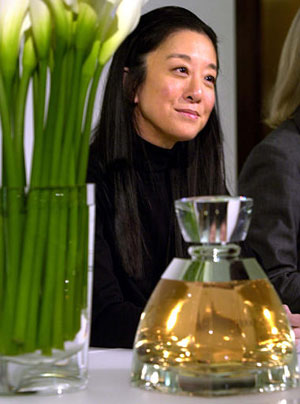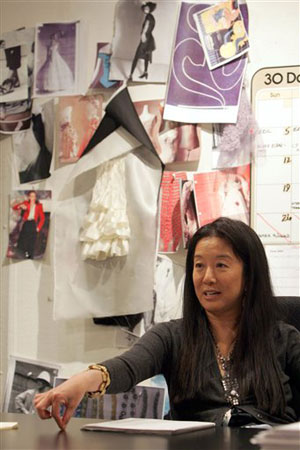|
GOLDSEA |
ASIAMS.NET |
ASIAN AMERICAN PERSONALITIES
THE 130 MOST INSPIRING ASIAN AMERICANS
OF ALL TIME
Vera Wang
PAGE 2 OF 3
 hile temping at Yves St. Laurent, Wang had met Frances Patiky Stein, Vogue fashion director, who had told her to contact Mary Campbell when she finished school. Campbell was head of hiring for Condé Nast and renowned for her ability to scout new talent. Wang went to see Campbell and was hired immediately as an assistant.
hile temping at Yves St. Laurent, Wang had met Frances Patiky Stein, Vogue fashion director, who had told her to contact Mary Campbell when she finished school. Campbell was head of hiring for Condé Nast and renowned for her ability to scout new talent. Wang went to see Campbell and was hired immediately as an assistant.
"I was a great assistant," she declares, "a true assistant. I mean, if something was left in my hands, it was done. Without even a concern." Wang must indeed have been remarkable because in less than two years, at the age of 24, she was made a full editor, the youngest editor ever at Vogue.
Wang recalls her 16 years at Vogue as a time of around-the-clock work and unrelenting pressure. During collection season, for example, she would attend shows from 9:00 a.m. until 3:00 p.m., run back to Vogue to look at film, select her choices of clothing, edit film until late afternoon, and then rush to the studio and work straight through until 2:00 in the morning, only to do the same thing the next day, and every day after that for a month and a half straight in order to catch the Italian, French, English and American collections. But she thrived on the work and the pressure and recalls it with some wistfulness.
"To be a fashion editor at Vogue, which is about the highest you can attain in fashion magazine-land, there's nothing you haven't been exposed to, no conditions under which you haven't worked, and you had to produce," she says. "You might be doing swimwear in January, or furs in July, with the makeup running and the hair limp and damp because the girl is sweating, but you have two days to do six of the biggest fur advertisers, and if you don't come home with extraordinary pictures, you're in deep trouble. And if your pictures aren't good over a period of time, you're in jeopardy for your job."
"It's like boot camp," she continues after some thought. "But when you walk out of there your mind functions differently. You don't ever see the world in the same way. And for that I'll always be so incredibly grateful."
Beyond the pressure and the excitement what appealed to Wang most about working at Vogue was the power to create. Even now as a designer, she maintains that it is not so much the designers but the fashion editors who set trends by combining elements — for example, by pairing a white terry robe with a Manolo Blahnik stone mule, or by putting a fur over sneakers and leggings. Wang left Vogue when it became evident that she wasn't in line for editor-in-chief because she wanted the power inherent in that position, not the power to rule over underlings, but the power to create, to have a vision and be able to express it and have it make an impact on people's lives.
"You have a huge responsibility when you run a magazine," she explains, "about how women are envisioned, and how women are received, and what possible transformations women can make, and I don't mean only from a fashion point of view, but from an intellectual and a humanistic and a cultural point of view as well. That's an enormous responsibility and an enormous job, and it's also a wonderful job if you have a strong vision about women. And I always have."
Wang calls her vision, which is reflected in the clothing she now designs, "modern clothes for modern women." It means an overall look that is sensual as opposed to aggressively sexy, feminine without being fussy, understated and confident, and above all, comfortable. She has nothing but disdain for jeweled dresses that weigh 30 pounds and practically put women in bondage. "I don't see modern women as wanting any part of that," she says.
At the root of Wang's ideas about women's fashion is a deep respect for women, which, sadly enough, is not a given among designers of women's clothes.
"I am a feminist," she declares. "When I stop and think about it, there's no other way I can label myself. I am for women. I think some of the greatest designers have been men, but I think there are some for whom women are abstract. It's a design concept. Or it's some kind of fantasy or joke on women. Either way, it's not based on a real understanding of women and women's needs. I respect other women, and my clothes show it. I'm not making fun of them or trying to degrade them or make them feel silly. I'm trying, if anything, to make them be at their very best."
PAGE 3
1 |
2 |
3
Back To Main Page
|
|
|
|


Fashion designer Vera Wang, always a ``fragrance wearer,'' is now a fragrance creator. Her new perfume is fashioned after classic French scents that evoke memories. Wang touted her fragrance at an appearance at Saks Fifth Avenue in New York on Feb. 13, 2002.
(AP Photo/Bebeto Matthews)
|
|
“I think some of the greatest designers have been men, but I think there are some for whom women are abstract.”
|

Designer Vera Wang gestures during an interview in her studio, Tuesday, June 14, 2005. Wang's latest collection is inspired by Matisse.
(AP Photo/Mary Altaffer)
|
CONTACT US
|
ADVERTISING INFO
© 1996-2013 Asian Media Group Inc
No part of the contents of this site may be reproduced without prior written permission.
|
